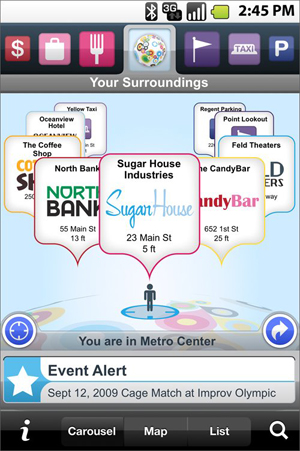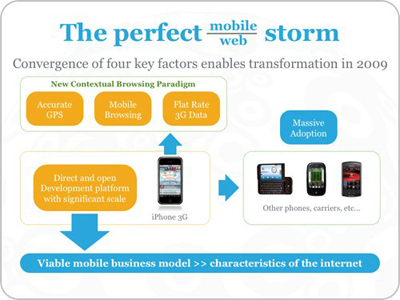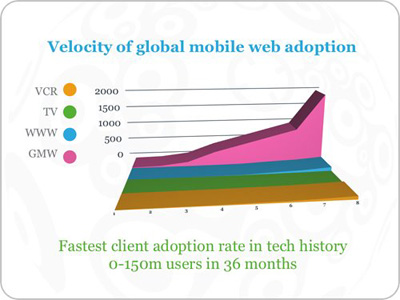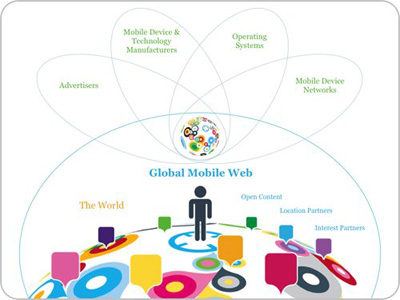What happens when a mobile device combines the capabilities of web browsing along with accurate location awareness? It's bound to create a new medium that will completely transform the way consumers find information and the way businesses interact with their customers.
And it's coming sooner, and faster, than you might imagine.
In the 1990s, the introduction of the World Wide Web forever changed the way we create, access and navigate information. It allowed anyone to publish information for little marginal cost and allowed users to easily consume information from anywhere in the world. This spurred an exponential surge in content, and search engines soon enabled rapid navigation of the massive volume of information flooding online. In the process, many consumer activities and large industries were transformed virtually overnight.
However, the World Wide Web was built for someone sitting behind a computer and as such, it has never really understood or cared too much about where its users were located. With the recent emergence of the iPhone - and now other smartphones - browsing to the World Wide Web from a mobile device is now quite workable, yet most attempts to create local mobile browsing experiences have faltered. This may be explained partially because the technology has only very recently matured sufficiently, but to a large extent, the problem may be more of a classic issue of learning how to unlock the groundbreaking capabilities of a new device experience.
As Joe Wikert has noted, "The first TV shows were basically radio programs on the television -- until someone realized that TV was a whole new medium."
Similarly, at present most mobile sites and iPhone content applications are really just the World Wide Web on your phone, which is very convenient, and in a properly-cached application format, pleasantly quick. Yet it's quickly becoming apparent that location-aware mobile browsing devices will soon offer a new medium of their own.

Location technologies on phones that can accurately pinpoint you to within a few feet are starting to enable scenarios unprecedented for an Internet device. Your experience at any location is largely determined by the information available to you while you are there, and correctly architected, services on this medium will help you to discover an almost unimaginable new world of contextually relevant information and experiences.
Imagine the scenarios for various locations. What information would be relevant and useful?
- At a beach: How are the rip currents? When is the surf coming in? What kinds of animals are in the tide pools?
- At the airport: Are there weather delays? What time are the departures?
- At the video store: What are the best rated new releases? When will a movie be available to rent?
All of this information will be just a click or two away - pre-aggregated, and pre-packaged. No need for the information desk, no finding a display monitor, no searching for flyers, no looking up websites. And beyond the obvious information, a whole new world of details you wouldn't normally think to associate with a location will be revealed:
- At the Sun Trust Tower in Atlanta: Did you know that peregrine falcons nest atop?
- On the Cal State Northridge Library steps: Did you know the Star Trek Drill scene was filmed here?
These scenarios are not science fiction. All the foundational pieces are in place. And very soon businesses and content publishers will start to first subtly and then radically reorganize their information and marketing messages so that they can be discovered contextually by location, time, and even humidity and temperature - a key factor for not only Haagen-Dazs stores' future promotional efforts but also for fire danger level alerts.

The commercial implications of this information will be transformative. The proliferation of location enabled devices such as GPS equipped smart phones provides an opportunity for businesses and organization to dramatically improve the quality of your experience by changing the way their information is created, organized, broadcast, and navigated.
Just as the late 90's created a land rush for business to move onto the World Wide Web, within the next three years every major location-based business will create mobile experiences for their properties. These will be automatically accessed on-site, allowing patrons to navigate all the information relevant to their products and services. Hotels will publish the meetings and the rooms they are in, along with the gym class schedule for the day, and the details on the complementary happy hour event.

And if it's a major hotel chain, they're not going to stop there. All the information that a concierge normally gives out will be just a couple of clicks away - a special offer at the spa, which just had a few cancellations, will be visible throughout the property. Navigate next door to the convention space, and the schedule, exhibitors, and evening events planned for tomorrow's trade show will also be neatly displayed.
No search needed. No keywords. No typing.
The content will be optimized for this new medium - the "Global Mobile Web", which is destined to accompany the fastest device adoption rate in the history of technology. With growth from effectively zero devices early 2008 to 10 million now to over 100 million in two years - in just the US alone - the impact on society will be far-reaching. It took the World Wide Web almost ten years to see that kind of user adoption.

As locations become densely embedded with contextual information, the Global Mobile Web will enable users to move beyond browsing the internet to essentially browsing the real world itself.
And while this Global Mobile Web - that fits comfortably in the palm of your hand - may at first seem small compared to the World Wide Web, it will soon cast a very large net as the majority of internet devices - billions of mobile phones - turn towards it as their primary source for location-aware information.
